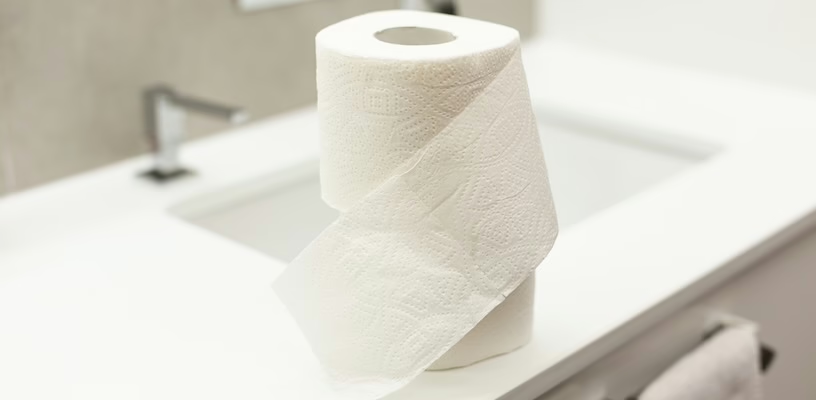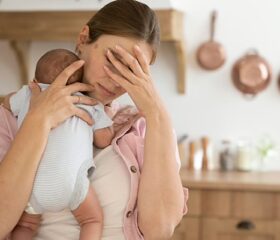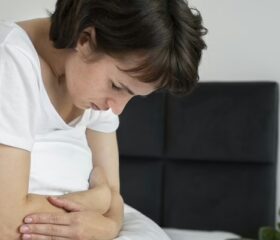Postpartum Diarrhea: Causes and Treatment Methods
You’re not alone if you’re experiencing a funny tummy and finding yourself needing to use the toilet frequently after giving birth.

You may have done your homework and braced yourself for the usual postpartum symptoms, such as postpartum swelling and postpartum bleeding. However, it’s possible that one less-than-pleasant condition, postpartum diarrhea, wasn’t on your radar.
Changes in the bowels after childbirth aren’t as widely discussed as some other postpartum discomforts, possibly because they don’t cause as much turmoil in new moms’ lives. That said, diarrhea can still be a nuisance, so let’s take a look at its causes and a few effective treatment methods.
What is postpartum diarrhea?
Having postpartum diarrhea means producing loose, watery stools at least three times a day after giving birth. Like diarrhea that occurs pre-pregnancy, it typically goes away within a few days. 1
Common symptoms that may accompany postpartum diarrhea include: 1
- Abdominal cramps or pain
- Fecal urgency or leakage
- Fever, chill, and bloody stools (if caused by a virus or bacteria)
Is it normal to have diarrhea during postpartum?
Yes, it’s normal to have diarrhea during the postpartum period. Childbirth is a very physically (and mentally) demanding event that puts your body through a lot of changes, which can cause several side effects, including diarrhea.
It’s common to experience diarrhea after giving birth regardless of whether you had a vaginal delivery or a C-section. However, it may be worse after undergoing a C-section due to the effects of the antibiotics you were placed on, the stress of your prolonged hospital stay, or the surgery itself.
What causes postpartum diarrhea?
Let’s take a closer look at the most common causes of this unwelcome symptom:
Hormonal shifts and uterine contractions
Your body deals with a tide of shifting hormones after childbirth. In particular, your progesterone levels, which are elevated throughout pregnancy and slow your digestion, drop sharply postpartum. This can trigger diarrhea. 2
On top of that, your stretched uterus will contract to return to its pre-pregnancy size once your little one no longer calls it home. These contractions can also cause looser or more frequent stools.
Pelvic floor recovery and trauma
Childbirth, especially vaginal delivery, can put a lot of stress on your pelvic floor muscles and the surrounding tissues. You may even tear your rectal muscles, which control the passing of stools, especially if you had a difficult or prolonged labor. 3 4
Your weakened pelvic floor muscles, especially if paired with torn rectal muscles, could lead to diarrhea (although this is more likely to cause an inability to control your bowels or fecal urgency rather than generalized watery diarrhea).
Other side effects of weakened pelvic floor muscles include: 5
- Back or hip pain
- An urgent need to urinate
- Leakage or incontinence
- Constipation
- Painful defecation
Postpartum medications
Many new mothers receive various medications during and after labor, some of which can affect digestion. They include:
- Pain relief medications: It’s a common and safe practice to receive pain relief medications during childbirth. While responsible use of them won’t harm your baby’s health or future development, some of them, such as ibuprofen and diclofenac, can cause diarrhea. 6
- Antibiotics: Doctors often give women who deliver via C-section antibiotics to minimize the risk of infection. Unfortunately, one potential side effect of antibiotics is bowel problems, including diarrhea. 7
It’s a good idea to ask your doctor about the available medications for labor and their side effects at least a few weeks before your due date. This allows you to make the best decisions for your body and prepare yourself for potential discomfort.
Dietary changes and infections
After giving birth, you can finally have many of the foods and drinks that are prohibited during pregnancy. (You might still need to avoid some, such as alcohol, if you plan to breastfeed.) 8
Some of your cravings might be for things—such as caffeine and fried or fatty foods—that could upset your digestive system, especially since you haven’t had them for quite a while. 9 10
Moreover, you may have a lowered immune system as your body recovers from pregnancy. This puts you at a higher risk of foodborne and diarrheal illnesses, such as E. coli and norovirus infections. 11
Since your diarrhea might be related to your postpartum diet, consider documenting what you eat in your journal or even your baby tracker app to see if any particular food is the trigger.
Stress and anxiety
Being a new mom is often a joyful experience, but it isn’t all sunshine and rainbows. Worrying about your little one’s well-being, coupled with sleep deprivation, can bring about a lot of stress and anxiety. This can sometimes affect your gastrointestinal tract, leading to diarrhea. 12
Stress-induced diarrhea often comes with other symptoms, including: 12
- Headaches
- Muscle tension
- Tiredness
- Restlessness and irritability
- A sense of being overwhelmed
- Sadness and depression
- Sleep issues
If you feel emotionally overwhelmed, don’t hesitate to reach out to your doctor. You might have postpartum depression or postpartum rage, which are both legitimate experiences that need to be taken seriously.
Can you breastfeed if you have diarrhea?
Yes, you can and should continue to breastfeed even if you have diarrhea. 13 Breastfeeding when you have digestive issues won’t make your baby sick. Just remember to stay hydrated and try to eat normally to maintain your breast milk supply. 14
While you won’t pass stomach bugs to your breast-fed baby, you can transfer certain medications you take to her. 13 If you have to take medications for your diarrhea (or other illnesses), remember to let your doctor know you’re breastfeeding so they can prescribe safe options.
How to manage postpartum diarrhea
Dealing with diarrhea while navigating the demands of new motherhood can feel overwhelming. Here are a few common-sense tips that can help you get over it more quickly.
Maintain a healthy lifestyle
As you now know, many of the causes of postpartum diarrhea are closely tied to your physical and emotional condition. It’s important to prioritize your own well-being as you recover.
Start by:
- Staying hydrated: Your body loses a lot of fluids when you have diarrhea. Be sure to replace them by drinking plenty of water (at least 8–10 glasses a day). 15 You can also drink sports drinks and salty broths, but avoid sugary drinks (including sweet juices), as they can worsen diarrhea.
- Eating a healthy diet: Steer clear of triggering foods and drinks, including spicy, fatty, and dairy foods and caffeinated beverages. 10 If your diarrhea is especially bad, you may want to incorporate more foods from the BRAT diet (bananas, rice, applesauce, and toast) in your meals; these are bland, low in insoluble fiber, and can help firm up stools. 16 Eat smaller, more frequent meals throughout the day instead of three larger ones to avoid overwhelming your digestive system. 15
- Getting enough rest: As mentioned, stress is sometimes the root cause of stomach upset. Try to sleep as much as you can and do relaxation techniques like deep breathing, meditation, or short walks. Even a few minutes of calm can make a difference.
Remember to maintain good hygiene and eat properly prepared foods to protect your lowered immune system from infection.
Get pelvic physical therapy
If your diarrhea stems from pelvic floor weakness or damage during childbirth, seeing a physical therapist who specializes in treating postpartum moms can be very beneficial. They can suggest and teach you how to do pelvic floor exercises tailored to your unique circumstances.
Take over-the-counter medications approved by your doctor
In some cases, you might need to take medication to get rid of the diarrhea or treat a related infection. 1 To reiterate, let your doctor know if you’re breastfeeding, and discuss with them which medications are safe for you and your baby.
You can also ask your doctor for suggestions for fiber and probiotic supplements. Remember that more isn’t necessarily better. Always follow your doctor’s advice and take the recommended dosage (and no more).
When should you see a doctor about postpartum diarrhea?
While postpartum diarrhea is usually temporary, certain symptoms warrant immediate medical attention, including: 1 15
- Diarrhea that worsens or lasts longer than 2–5 days
- Stools with an unusual odor or color
- Nausea or vomiting
- Blood or mucus in your stool
- A fever that persists or is higher than 102 degrees
- Severe stomach pain
- Signs of dehydration or an inability to keep fluids down
Visit your doctor immediately if you notice any of those symptoms. They can rule out more serious conditions, recommend appropriate treatments that are safe for breastfeeding, and refer you to specialists if needed.
Final thoughts
Postpartum diarrhea is a common (although sometimes overlooked) experience for many new moms. The good news is that the illness is typically short-lived and your stomach should settle before you know it.
In the meantime, drink plenty of water and try to eat as healthily as possible to keep those annoying stomach bugs at bay.
Article Sources
- MedlinePlus. "Diarrhea" Retrieved September 30, 2025.
- Northwestern Health Sciences University. "Be Well: The Hormone-Digestion Connection" Retrieved September 30, 2025.
- NewYork-Presbyterian. "Rectum, Anus, And Anal Sphincter" Retrieved September 30, 2025.
- Chirag Global Hospitals. "Anal Fissure During Pregnancy: Understanding the Condition" Retrieved September 30, 2025.
- Stamford Health. "How to recognize - and treat - pelvic floor problems" Retrieved September 30, 2025.
- University Hospital Southampton. "Your medication after the birth of your baby" Retrieved September 30, 2025.
- Healthline. "Here’s What You Need to Know About Bowel Issues After a C-Section" Retrieved September 30, 2025.
- Centers for Disease Control and Prevention. "Alcohol" Retrieved September 30, 2025.
- Mayo Clinic. "Diarrhea" Retrieved September 30, 2025.
- Harvard Health Publishing. "Is something in your diet causing diarrhea?" Retrieved September 30, 2025.
- Vermont Department of Health. "Common Foodborne and Diarrheal Illnesses" Retrieved September 30, 2025.
- MedicalNewsToday. "Stress diarrhea: Signs and management" Retrieved September 30, 2025.
- Centers for Disease Control and Prevention. "Foodborne and Waterborne Illness and Breastfeeding" Retrieved September 30, 2025.
- MedicalNewsToday. "Foodborne and Waterborne Illness and Breastfeeding" Retrieved September 30, 2025.
- MedlinePlus. "When you have diarrhea" Retrieved September 30, 2025.
- Cleveland Clinic. "What To Eat When You Have Diarrhea" Retrieved September 30, 2025.






